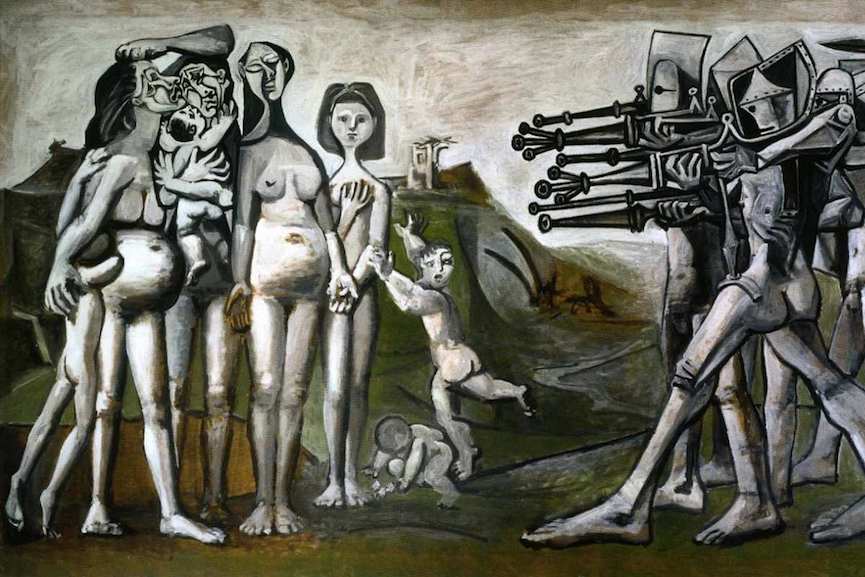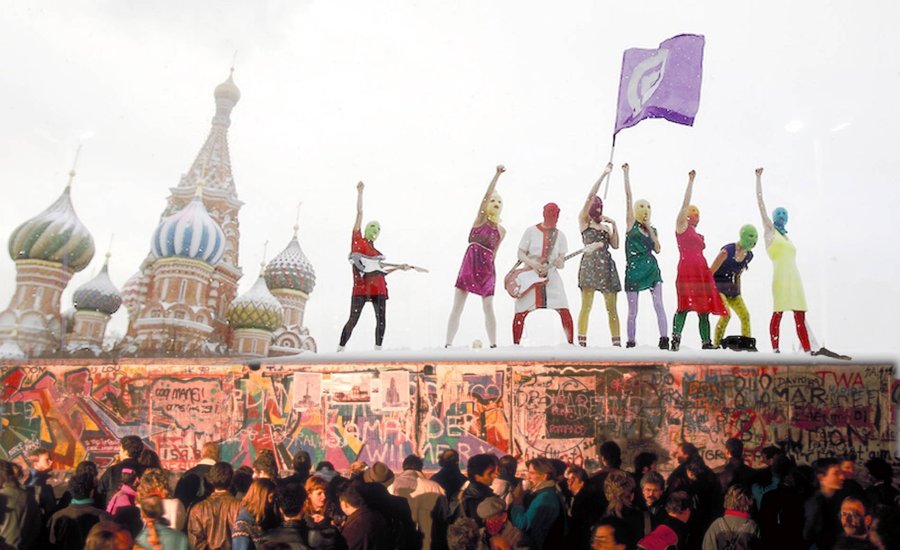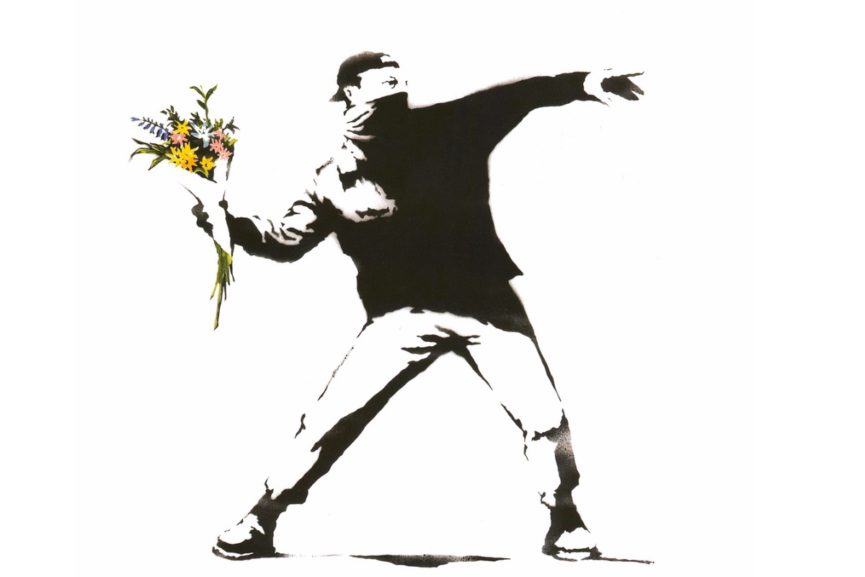 |
Pablo Picasso - Massacre in Korea (1950) |
is now exposed to more images in a day
than anyone in the 14th century would have seen in their lifetime.
Music is everywhere, attached to an ever growing array of pitches for medical devices,
inexplicable pharmaceutical products with interminable lists of disastrous side effects,
and smiling sociopaths running for political orifices. The wealth of the arts is available to anyone with internet access. And there is quality available out there.
But you have to seriously seek it out.
Most of it is garbage.
Most of it needs excising.
Just like cleaning up stuff at home, we are tempted to keep things because we’re fearful that we might be missing something.
We are probably not.
We have to discard.
We have to throw things away & cleanse the doors of our perception.
The effort must be made to discern what is worth looking at, hearing, and remembering.
What are the images of relevance? What is music that matters?
What value will I retain from the art I consume?
Louis Isadore Kahn, the noted Philadelphia architect said
"The creation of art is not the fulfillment of a need, but the creation of a need.
The world never needed Beethoven’s Fifth Symphony until he created it.
It is the prerogative of art to make the world whole and comprehensible.Now we could not live without it.”
Music has the power to restore the world and allow us to glimpse it within ourselves in all its glory, mirth, sorrow, and occasional nastiness. As does visual art.
The arts tend to do this in ways other types of communication simply can not.
The music I love closes the gap between "me" and everything that is not "me".
It moves me in ways beyond transcendence.
The works of art I love do much the same.
There is a quality of recognition in there.
An awareness of connection.
Between the creation, the creator, & the observer.
When you see the ancient cave drawings, do you not know something of the person who created it?
The experience bounces from feeling to meaning.
It makes them whole, indiscernible from one another.
It's not something that committees can do.
It's not a task achieved by groups or by movements.
It's done by individuals, each artist mediating in some way
between their sense of a history and their experience of the world.
Yet the arts have another function historically.
One that could or should be more evident today.
Decades age, art critic Robert Hughes made a note of this in his book "The Shock Of The New" -
“What has our culture lost in 1980 that the avant-garde had in 1890? Ebullience, idealism, confidence, the belief that there was plenty of territory to explore, and above all the sense that art, in the most disinterested and noble way, could find the necessary metaphors by which a radically changing culture could be explained to its inhabitants.”It’s one thing to move someone with a work of art.
It’s another thing to mobilize them.
For centuries, artists have used their canvases, sculptures, films, and musical compositions to express their political views. Sometimes it's to offer a commentary,
sometimes it's to initiate real social or political change.
As we peer back with the advantage that hindsight yields it's easy to see the artists of Weimar Germany and Leninist Russia lived in a much more attenuated landscape of media than we do today. There was a reward in a way in that they could still believe, in good faith and without bombast, that art could morally influence the world. Today, the idea has largely been dismissed, as it must in a mass media society where art's principal social role is to be investment capital.
We still have political art, but we have no effective political art.
Perhaps the same can be said of satire.
Art and satire have been the greatest operational weapons against power historically.
Is it me? Or is have these arrows lost their sharpness?
In the 1960s, Country Joe & The Fish, a fine musical coterie in their own right, who also mixed acerbic satirical wit with their music, could arguably be said to have ended the Vietnam war with a song.
Give me an F
Give me an I
Give me an S
Give me an H
What's that spell?
FISH!
What's that spell?
FISH!
What's that spell?
FISH!
Yeah, come on all of you big strong men
Uncle Sam needs your help again
He's got himself in a terrible jam
Way down yonder in Vietnam
So put down your books and pick up a gun
Whoopee! Going to have a whole lot of fun
And it's 1, 2, 3
What are we fighting for?
Don't ask me, I don't give a damn
Next stop is Vietnam
And it's 5, 6, 7
Open up the pearly gates
There ain't no time to wonder why
Whoopee!
We're all going to die
Well come on generals let's move fast
Your big chance has come at last
Got to go out and get those reds
The only good Commie is the one who's dead
And you know that peace can only be won
When we've blown them all to kingdom come
Well come on Wall Street don't move slow
Why man, this is war-a-go-go
There's plenty good money to be made
By supplying the Army with the tools of the trade
Just hope and pray that if they drop the bomb
They drop it on the Viet Cong
Well come on mothers throughout the land
Pack your boys off to Vietnam
Come on fathers don't hesitate
Send them off before it's too late
Be the first one on your block
To have your boy come home in a box
The impact that song had on the nations psyche eventually, can not be overestimated.As far as today's politics is concerned, most art aspires to the condition of Muzak.
It provides the background hum for power.
We are tempted to say...
We need another Country Joe & The Fish.
We need another Joe Strummer
We need another Goya.
We need another Picasso.
We need another Orwell.
But that's not it exactly, after all they owe us nothing.
We owe them a great deal. And history has it's role, but as an informant.
The past should not be repeated...not as a goal.
What we need is art that is EFFECTIVE politically.
Truth has a funny way of revealing itself eventually.
Democracy can be said to be "the least worst" way to organize a society.
And it has had a tendency to be crisis ridden.
Yet so far, democracy has emerged from each of it's illnesses almost in spite of itself.
It's downside is it never seems to see the crisis coming, let alone do anything to prevent it.
But in the last moment, it manages to act and live to die another day.
This survival skill must not be taken for granted.
Survival of one disease is no guarantee of survival of the next.
This is where political art may be crucial.
Actually stopping sabotage and disease before it reaches critical mass.
What is political art? Is it different than art?
Well, the ruling mechanisms over all aspects of humanity impact artists just like anyone else.
So for some, reflecting deeply on this subject would be unavoidable...it's part of life.
From its beginnings, art has been inseparable from the societies it was created in.
Throughout history authors have reflected their present moment,
bringing the artistic truth to the general public.
Sometimes an artistic truth is political truth as well.
For Plato and Aristotle, mimesis – the act of artistic creation
is inseparable from the notion of "real world", in which art represents or disputes the various models of beauty, truth, and the good within the society.
 |
| Pussy Riot |
The aesthetic value of any work of art does not rise from the work's apparent ability to affect the future. Cézanne is not valued because of the Cubists who drew from him. Value rises from deep in the work itself. Music and art must possess a vitality, some intrinsic quality that resonates, addresses the senses, the intellect, and fires the imagination. If political art can meet that criteria, and if it's widely distributed or seen, I suggest it can change the world.
World War I changed the narrative and images in art, radically and forever.
It brought our culture into the age of a mass-produced, industrialized death.
This, at first, was indescribable. Language failed.
But art succeeded. The music of the 20th century reflects all this,
the chaos, the horror, the hope & the fear. The Id, the ego, the 12 archetypes.
It's all there. Along with the uneasy acceptance of a quantum mechanical world.
Those who don't care for modern art simply don't care for the century it reflects perfectly.
And caring for it, finding beauty in it; is difficult I suppose. But the first law of art is contrast.
No dark without light. No resolutions without dissonance.
And that my friends is the point.
Muzak, and pretty landscapes have a place, a minimal one.
But real art is often disturbing on some level.
Neoclassicism and minimalism are frankly, a bore.
We gotta get out of this place!
Artistically...and politically.
Postscript-
Yes, yes, yes, I hear you...there ARE good artists doing good work.
I agree. But are they effective?
I'm not seeing it (hearing it).
The reasons they are not effective is fodder for some future post.
It has nothing to do with the quality of their work.
But maybe the methods of delivery to large audiences is simply no longer permitted.


No comments:
Post a Comment